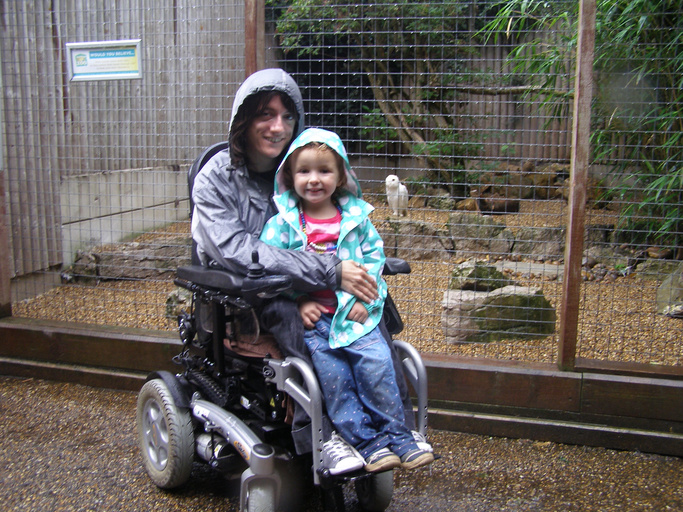Helping or Hurting Mothers with Disabilities (Plain-Language Version)
Download PDF | Original version

The Disabled Parenting Project (DPP) has hosted two Mother’s Day Twitter Chats. In 2016, 152 people participated and there were 900 tweets. In 2017, 83 people participated and there were 377 tweets. Each Twitter Chat lasted an hour. One of the important topics people discussed was things that make being a mother with a disability easier or harder.
Hurtful comments about disability
Participants had to deal with people who thought they could not be good parents because of their disability. These people included medical staff, schools, family and strangers. Many of them thought these bad attitudes about disability made it harder to be a mother with a disability.
-
“Mothers with disabilities face societal stigma [being treated badly] and sometimes isolation from peers (other disabled moms).”
-
“I think there's a lack of understanding from others. People assume we need/want help, and that can get pretty intrusive.”
-
“Attitudes are [the] biggest barrier. Assumptions that disability means inability [to be] a mother or effectively care [for]/raise kids.”
-
“The biggest challenge remains society’s barriers-many of which are attitudes. Self-doubt is sometimes a barrier too.”
-
“A four-letter word for fear is bias. MUST end antiquated [old-fashioned] views about disability.”
-
“Opinions of [able-bodied] folks including medical and social service providers, but also those closest to us.”
-
“I think it’s the criticism of people that are able bodied.”
Services and Supports
Services and supports can make motherhood easier or harder. This depends on whether people can get the help they need or not. Many participants said they should have more help.
-
“Finding in-home support, fear of losing children because of negative assumptions, financial security + more.”
-
“Any service that can listen to what the mother thinks she needs rather than dictating her needs for her. Hard to find.”
-
“My biggest challenge has always been transportation since I am a non-driver.”
-
“Finding a support network, adaptive equipment, sensitive medical personnel.”
-
“The universal design of SO much technology helps [with] the option to outsource services-even online grocery shopping.”
-
“Ignorance and availability of services and supports to meet our unique needs.”
-
“I think the biggest challenge facing moms with disabilities is a lack of readily available resources to assist and support.”
-
“It depends on your disability. As a blind mom I get support and in home training from the NY commission for the blind”
-
“Having a post-delivery nurse who ‘got me’ was [important]. I actually asked to have the same nurse with my 2nd [caesarian section] as my 1st.”
Support and Information from Other Mothers with Disabilities
Getting support from other mothers with disabilities helped the participants. So did getting good information on parenting with a disability. But some other people said not having any information or support made it harder.
-
“The low expectations of society and lack of strong [role] models w/ disabilities who can serve as mentors.”
-
“We have a listserv [for] parents @ nfbnet.org; just launched blindparents.org [with a] mentoring program available.”
-
“I have a tight knit mom crew that I talk to daily. I also talk to trusted teachers who are able to think outside the box.”
-
“Fortunately now there are online resources/disabled parents’ groups [because] when my daughter was younger [it] was hard to find any.”
-
“I go to other members of the disabled community who are supportive-some moms [are,] some not.”
-
“I go to http://disabledparenting.com for all resources disability & parenting”
-
“Support groups of other disabled mothers for relatability, swapping tips/resources/best practices/sharing frustrations!”
-
“Peer support is crucial. Disabled moms need access to same supports and connections nondisabled moms have!”
-
“My biggest support has been from other moms with dwarfism. Peer support/mentoring is critical.”
-
“I found few bloggers, but mostly I felt like I was writing my own rules.”
-
“Other [people with disabilities] moms on the internet and in real life, general internet searches, but mostly I've figured out things on my own.”
Informal Supports
Some people said that informal supports, such as family, friends, and partners, helped them as mothers.
-
“I had a great playgroup. A strong village is key. My mom who always said I could do it all.”
-
“I also recruit family and friends to give my daughter experiences she’s wanted that aren’t accessible to me (ice skating).”
-
“Natural supports often come from an integrated, inclusive community. These help all families.”
-
“Honestly, a supportive parenting partner. Having someone who knows my needs and helps support me.”
Adaptive Equipment (tools that help people with disabilities, like wheelchairs, canes or hearing aids)
Several of the participants said that adaptive equipment was helpful.
-
“My wheelchair, ironically. My power chair is crucial [to] facilitating my ability to care for 2 young children.”
-
“I find it helpful to keep up with mainstream parenting gadgets and programs to see how we can make them fit.”
